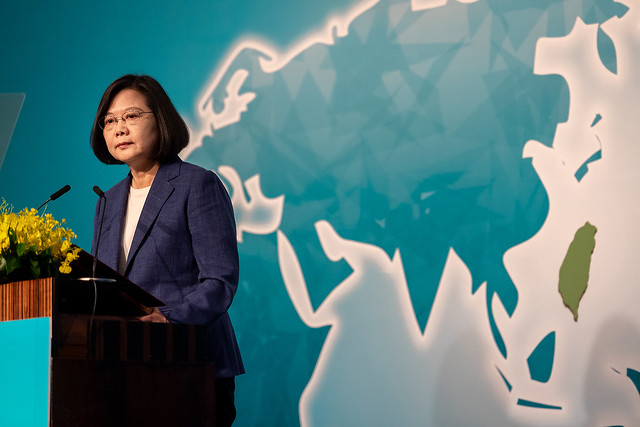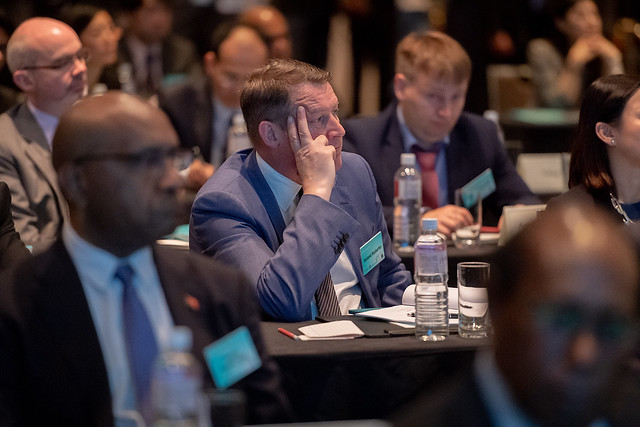News & activities
 News releases
News releases
President Tsai Ing-wen attended the opening ceremony of the Ketagalan Forum: 2019 Asia-Pacific Security Dialogue on the morning of August 20, and emphasized that Taiwan will continue to advocate the values of freedom, democracy, and human rights throughout the Indo-Pacific. She also looked forward to seeing even more regional partners join us to share their experiences and explore solutions.
A transcript of the president's remarks follows:
Dr. Mark Chen (陳唐山), Chairman of the Prospect Foundation;
The Honorable Christopher Pyne, former Australian Minister for Defense;
Foreign Minister Joseph Wu (吳釗燮);
Distinguished guests, friends and colleagues:
I want to first welcome our guests from around the world. I know many of you traveled quite a long way to be here.
In particular, I want to welcome former Australian Minister for Defense Mr. Christopher Pyne. I am delighted to have you with us. I understand this is your first visit to Taiwan, and I hope this will be the first of many to come.
All of you here know that political, military, and economic conditions in our region can change in the blink of an eye. At last year's opening ceremony, we talked about the progress being made towards denuclearization of the Korean Peninsula. Yet today, those negotiations remain unsettled.
Meanwhile, the US-China trade dispute continues to disrupt global supply chains even a year later. And this rivalry between the world's two largest economies shows no signs of abating. This conflict has shaken the global economy and forced countries to rethink their trade and economic strategy.
Yet despite the impacts, Taiwan's economy continues to thrive, showing steady growth once again this year. Through our New Southbound Policy, we are diversifying our economy, developing stronger trade relationships, and helping maintain regional stability.
This policy has facilitated substantial trade growth over the past three years. And more importantly, that growth has been sustainable. Last year, trade with New Southbound countries totaled US$117 billion—a nearly 6% year-on-year increase. Taiwan's sustainable cooperation model emphasizes mutual development, benefiting the region as a whole.
Outside the economic sphere, maritime military expansion also threatens stability in the Indo-Pacific. Many countries have expressed concerns over China's actions in the South China Sea.
Indeed, China has taken an increasingly assertive stance in these contested waters. They have laid claim to disputed reefs and built artificial islands as bases for military installations.
Other than traditional military threats, attempts have been made by authoritarian regimes to take advantage of the freedom, diversity, and openness democracies enjoy. The intention is to meddle in domestic politics, hoping to influence foreign policy decisions.
In light of these serious challenges to global freedom, Taiwan's geostrategic importance as a bastion of democracy in the region is now more important than ever.
Yet China refuses to renounce the use of force against Taiwan, and continues to seek to impose its "one country, two systems" model on us. But I want to be very clear: Hong Kong's example has proven once and for all that democracy and authoritarianism cannot coexist.
Taiwan stands strong against coercion. We continue to advocate the values of freedom, democracy, and human rights throughout the Indo-Pacific.
In 2018, we established the Ocean Affairs Council to promote international cooperation and the sustainable development of marine resources. Earlier this year, we signed a number of coast guard agreements with Pacific allies that will promote further collaboration in law enforcement, marine research, and humanitarian aid.
The Taiwan-US Global Cooperation and Training Framework is also providing opportunities for countries throughout the region to build networks and jointly address a wide range of issues, including disinformation, women's empowerment, and public health.
Going forward, we hope to see even more regional partners join us to share their experiences and explore solutions.
Maritime issues in our region are constantly evolving, but as a responsible regional stakeholder, our message remains consistent. That is Taiwan has always advocated shelving disputes, promoting joint development, and resolving conflicts by peaceful means through multilateral negotiation.
Here in Taiwan we are fully aware that our own security is crucial to regional and global security. And we are determined to defend ourselves against all threats, both traditional and nontraditional.
To ensure that Taiwan continues to do its part, we are strengthening our defense and multi-layered deterrence capabilities. We have already begun to build our own aircraft and submarines. In fact, our first self-manufactured advanced training aircraft will be completed in late September this year.
We also appreciate the four rounds of arms sales already announced by President Trump's administration. These packages reaffirm the United States' longstanding commitment to helping maintain peace and stability in the Taiwan Strait.
Our commitment to security is also about defending the shared values that have underpinned the rules-based international order and led to sustainable prosperity for all.
It is undeniable that democracies around the world are being tested like never before. As we face the challenges that lay ahead, we must come together, just as we have today, to create a better future for generations to come.
In closing, I want to take this opportunity to thank Dr. Chen and everyone who made today's forum possible. I hope today's discussions will break new ground for us as we work toward a freer, more open Indo-Pacific. Thank you!
Among those present for the ceremony were National Security Council Secretary-General David T. Lee (李大維), Foreign Minister Joseph Wu, and Prospect Foundation Chairman Mark Chen.
The president then accepted questions from the media. In response to a question regarding demonstrations in Hong Kong, which have spurred Facebook and Twitter to suspend hundreds of thousands of accounts backed by the Chinese government, the president stated that everyone is concerned about the use of fake accounts to spread disinformation. Many countries are already subject to such infiltration and attacks. Thus, the steps Facebook and other social media are taking to prevent the dissemination of disinformation are positive developments. Rather than exploiting disinformation to mislead Hong Kong citizens, the Beijing authorities should earnestly and sincerely communicate with them, so that they can find a solution together, she said.
In response to a question regarding demands by the Ministry of Foreign Affairs of the People's Republic of China for the United States to cancel sales of F-16V fighter jets to Taiwan lest they take necessary countermeasures, the president pointed out that the United States enables Taiwan to maintain sufficient self-defense capabilities under provisions laid out in the Taiwan Relations Act (TRA). This is a longstanding US policy under the TRA, she added. Taiwan has a right to defend itself, she said, and she expressed hope that China would respect this right.











